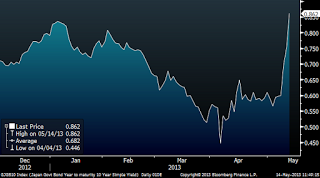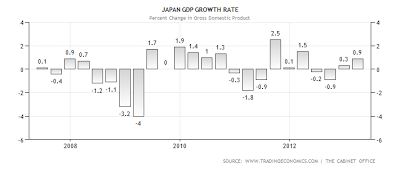The play year-to-date has been that historical QE would push yields lower, as they have in the US QE process, but there appears to be sharp rotation away from JGB’s in recent days.
Additionally, seems that this massive stimulus is not working well… Energy costs have soared 26% since January.Yes, nominal GDP is up 0.9% (3.5% ytd)… After collapsing in the last quarters of 2012… Printing money gives the laughing gas illusion. But wages, investment and corporate spending are still subdued. According to Bloomberg, “dragging on growth for a fifth straight quarter, private non-residential investment subtracted 0.3 percentage point from annualized real GDP. The level of business investment in January-to-March was the lowest since the second quarter of 2011. Companies also drew down inventories last quarter, taking 0.8 percentage point off GDP. The so-called GDP deflator, a broad measure of prices across the economy, tumbled 1.2 percent from a year before, the most since the final three months of 2011, underscoring Kuroda’s challenge as he seeks to end more than a decade of entrenched deflation”.
Wait til cost of debt and energy adds to the corporate bills.
“Abenomics is like smothering a jalapeño pepper with chocolate. It still tastes of jalapeño” (heard in market)
“The ‘Third Arrow’ was never going to be a magic bullet because deregulation means changing behaviour and moving from vested interests to new entrant investment,” said Jesper Koll, head of Japanese equities research at JP Morgan in Tokyo. “You are in a country that is obsessed with creating a Japanese-style capitalism rather than market fundamentalist, Anglo-American-style capitalism. It’s still Japan”
Japan’s Manga Money Policy: (This article below was published in El Confidencial in Spanish)
“The Bank of Japan’s huge bet by boosting quantitative easing will not turn the economy around and is instead sending the nation Toward default” Takeshi Fujimaki.
A well-known blog (Macro Man ) calls the latest stimulus “the Japanese laughing gas” because it creates an illusion of happiness . I call it monetary Manga, in honour of the superbly fantastic comics from Japan.
In my opinion, supporters of this policy face two problems: the evidence of the failure of the experiments of recent decades and especially if other countries take to the same madness policies, the side effects are simply unpredictable . In any case, the “experiment” will be paid by you.
Wild stimulus policies are always adorned with a “social” objective. “It’s for your good.” “Without them it would have been worse.” But they are profoundly unjust, anti-social and, most importantly, ineffective. They just benefit financial assets and cronyism.
Some say Europe should do the same. Why?
The simple explanation is that they assume that if you print money, liquidity floods the system, it stimulates productive economy, savers are forced to reinvest, which in turn improves the country’s debt situation, lowers the cost of debt of companies, reducing unemployment and avoiding deflation. What a blast! All at once. No need to change the economic model of low productivity sectors, and welfare state inefficiencies. Just devalue and stimulate. Except it does not work.
Spain, a country that experienced the disastrous competitive devaluations of the 90s, should know. A country that sank the economy and put it at the brink of bankruptcy “stimulating” through spending between 2007 and 2011 should be cautious and learn from its history. But no. We like Japan, but without Mitsubishi or its productive workforce.
After many trillions spent and years of implementing the policies that some want for the EU:
- Japan will reach a debt to GDP of 245% in 2013 according to the IMF, rising for the sixth consecutive year. The risk of default, curiously, has soared between February and April, although still low.
- Public spending is unsustainable. The country’s financing needs reach over 60% of GDP in 2013, compared with 25% in the U.S.. Japanese public debt exceeds twenty times the country’s fiscal revenue.
- The trade deficit reached a record of 64 billion euros . This is important because the main trading partner of Japan is China, and the decision to attack so aggressively with monetary policies can be a backfire if China reacts. Japan also imported 87.3 million tons of gas and 3.6 million barrels a day of oil, which is paid in dollars. To devalue the yen only becomes inflationary on energy bills.
- Unemployment has not dropped, remaining at the average of 2003-2012 . In fact, it has risen from 3.83% to 4.42% between 2007 and 2013.
I focus here on the Credit Suisse report “Japan Implications” and DBS Group’s “Japan: Gauging the Impact QE” to see how many things remind us of our countries.
The Bank of Japan has been implementing expansionary policies since 2001, and so far:
- Lending does not improve. In Japan, as you can see in the graph below, lending has stagnated at levels of 2003 and is absorbed by the state-debt and mega-conglomerates.
- The stock markets react to the agresiveness of policy, like throwing a stone into the water. But its effect is diminishing. Of course, the Japanese stock market has risen 45% so far this year, but masks a more modest 22% in US dollars. In the end, what matters is if the sectors have low growth and low profitability or not.
- It supports low productivity industries . Devaluation and stimulus perpetuates uncompetitive models and takes money from savers pockets, only to give it to those sectors to maintain their activity a few more years, pay some taxes and help support a huge public spending.
- Add to this combination a population pyramid that the prime minister himself considered “unsustainable.” It’s a bomb on a pension system that drags an unsustainable public spending.
So why do it? Easy, let me tell you where the money from the Japanese population is. In deposits and currency, 56% of the total. The Japanese citizens save. A lot. The government feels the need to stick its hand in that pocket … devaluing. But the Japanese, like the Europeans, do not spend more. The big problem is that the velocity of money, which reflects economic activity-continues to fall despite wild liquidity. It is all in bonds of extremely indebted states and banks. The lack of consumer confidence does not dissipate by manipulating monetary variables because most fears come from lack of security and tax increases.
Japan, the ‘Hedge Fund’ of a single bet.
The Japanese economy is extremely dependent on the global economic cycle -correlation of business profits to global industrial production is twice compared with the U.S. or the UK-, and generates very low margins. Several large companies get returns significantly below their cost of capital. Exporters, but not tax paying -due to low margins- enough to support a bloated state and an ageing population .
The decision of the Bank of Japan is like a huge speculator borrowing dozens of times is assets with a single bet : that Japan will export its way to profitability and generate sufficient tax revenue at the expense of the rest of the world. That bet is exactly that of all OECD countries are following. Just this time, Japan is much more leveraged. A bet with the money of future generations.
The consequences of following the Japanese monetary policy elsewhere are clear:
- The countries’ debts are not reduced, they soar. With more money, governments spend more, forget to reform, and decide to maintain unproductive models.
- It becomes, as in 2001, a model that encourages financial risk taking in an excessive manner, but at a time when banks, companies and households are still heavily indebted, which may lead to shocks in economies that still remain very fragile.
And of course, like Japan in the two lost decades, we would see that big structural problems are not solved and that countries do not reform . As such, if the rest of the OECD relaxes to the manga money illusion, Japan would lose its bet as growth will remain anaemic, and not just remain in an untenable situation, but even weaker.
If Europe and the U.S. want to win this race with Japan, it’s best to use the liquidity and asset bubble to reform, to be more competitive and reduce public spending. That is why I totally agree with the stance of Germany and Finland in the European Union and defend not to participate in the contest “to see who gets into more debt and defaults first.” If I am not right, we will be better anyway. And if I am correct, we will avoid being the fool who gets the shortest stick in the contest of “who goes bankrupt”.
FT comment:
http://www.ft.com/cms/s/0/9e491fa0-ccf2-11e2-90e8-00144feab7de.html#axzz2VFe0fkj8


This is exactly what Kyle Bass said would happen – Japan’s mega-QE would only bring forward their debt crisis. Repeat with me: “there is no free lunch”.